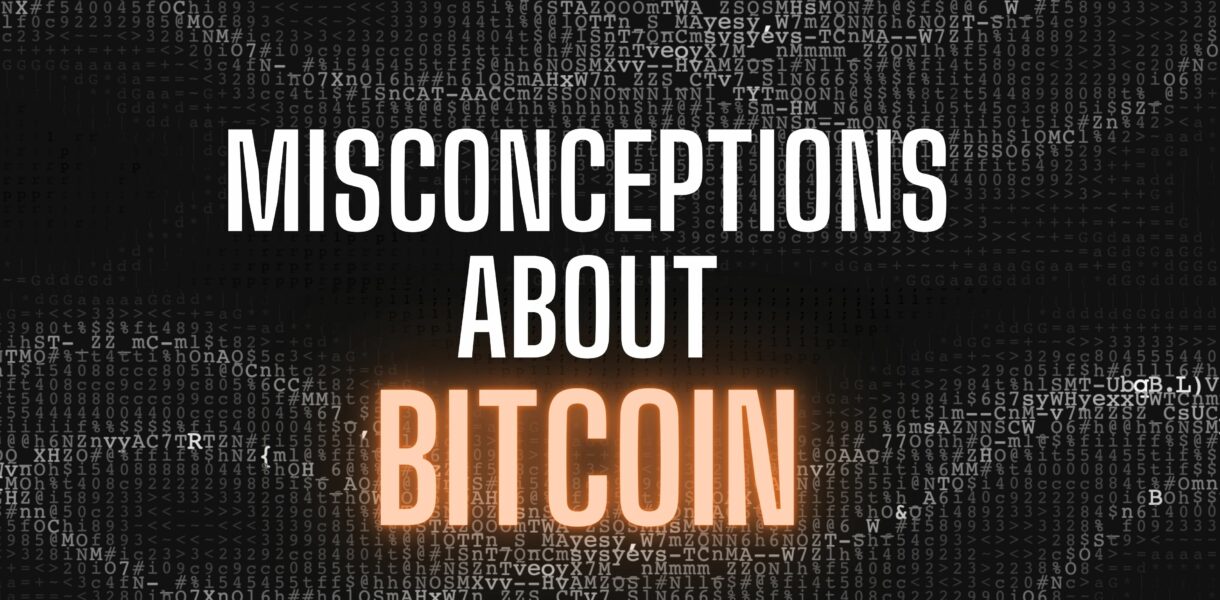Bitcoin is a complex subject and there is an enormous amount of information to sift through and make sense of. Unfortunately, there is also a lot of misinformation and misunderstanding surrounding Bitcoin so we have done a bit of myth-busting. We want to continue with our Bitcoin Basics this week and focus on some misconceptions that many have about Bitcoin. If Facebook, Twitter and others can do Fact Checking – so can we.
#1 Bitcoin transactions are completely anonymous
False. Bitcoin is pseudonymous which means you can use any name you want to transact in Bitcoin. Every transaction is, however, recorded in a public ledger and so it is possible to connect the dots and eventually reveal a person (and how much Bitcoin they own) via their transaction history. Many people are revealed at the point of KYC at an exchange and their transactions can be recorded through the ledger from then on.
That is why we have suggested that experienced users should look at solutions like Whirpool to remove one’s identity from their Bitcoin.
#2 Bitcoin is favoured by criminals and money launderers
False. Bitcoin is only favoured by stupid criminals because it’s pseudonymous nature (see point above) makes it very easy for law enforcement agencies to track and catch criminals and confiscate their coins. It is not more favourable to criminals.
Criminals are known to use more private cryptocurrencies such as Monero or Zcash.
It is also important to note that the latest estimates for illicit activity on Bitcoin stands at 0.5 – 1%.
#3 Other cryptocurrencies are dilutive to Bitcoin
False. Thousands of new cryptocurrencies have launched since Bitcoin went live in 2009 and there is no black and white answer as the whether they have had an effect on Bitcoin’s price.
Other cryptos need to be separated from Bitcoin, just like other assets/commodities are as well.
When more tin is mined, does it affect the supply of gold? No, they are unrelated, just as Bitcoin is unrelated to the thousands of other cryptocurrencies.
However, as explained before – Bitcoin is certainly regarded as a risk-on asset alongside the S&P500 etc. Just have a look at what happened to Bitcoin’s price this morning, alongside the American markets.
It it thus speculative in nature but as the central powers continue to power the fiat system and devaluation of currencies – it is probably that Bitcoin continues its trajectory to more risk-off.
The same cannot not be said for other cryptos which have an endless supply when looked at cumulatively.
Bitcoin may continue to eat at gold’s market cap, whilst other cryptos need to seek demand from other places.
Only time will tell.
#4 “I can’t buy Bitcoin, because the price for one single bitcoin is too expensive!”
False. You do not have to buy a whole Bitcoin. You can buy the smallest unit of a Bitcoin called a Satoshi which costs less than a cent. You can buy as much or as little as you can afford to invest. Bitcoin is for everyone.
#5 Bitcoin’s total supply is not actually fixed because Bitcoin is divisible into tiny increments
False. To illustrate why this statement is wrong we need to replace Bitcoin with pizza. If we have a pizza and cut it into millions of pieces, do we have more, less or the same amount of pizza? We have the same amount.
Bitcoin will always have a cap of 21 million. Nothing whatsoever can change that. Anyone who tries, simply starts a new blockchain and different crytpto which will probably end in failure (we’re looking at you, Bitcoin Cash/SV).
#6 Bitcoin can be mined with any PC hardware.
False. In the very beginning this was possible but now you need specialized ASIC hardware. In order to generate profit you need the latest hardware and the cheapest electricity. It is one of the most competitive landscapes in the world.
#7 Governments will kill Bitcoin
False. While it is true that many governments have banned or tried to ban Bitcoin, such as in Nigeria, Russia and China. In each case Bitcoin has proved that it cannot be shut down and in many of these examples, Bitcoin has actually thrived. Bitcoin is a permissionless system that is not controlled by any central power.
That is why it is absolutely vital that Bitcoin remains consistent in its ways and keeps its blocks at ~1MB. This allows for thousands of people to set up full nodes around the world easily and maintains its decentralized nature. More importantly, it is imperative that more people custody their own Bitcoin and not keep it in massive pools with custodians such as exchanges.
With Ethereum however, Vitalik confirmed a few days ago that one would need 90 Terrabytes per year to maintain an Ethereum node. This is not scalable for the individual at home. So, it is inevitable that Ethereum will become more centralised via specialised servers and prone to attack.
#8 Bitcoin wastes energy
This is an extremely complex topic that I intend to write more about. 5-hour debates have been conducted on this topic alone.
If you simply look through the eyes of a Bitcoin holder, then Bitcoin does not waste energy. The energy consumed to mine that Bitcoin, is what gives it its underlying value and connects this ethereal object to the real world.
Proof of Work is the key characteristic of Bitcoin and I implore anyone who is interested in Bitcoin, to learn as much as possible about POW, before taking the next step.
One can compare gold, its scarcity and amount of man hours/energy that it takes to mine it – to Bitcoin.
But on another spectrum, one can say Bitcoin is digital energy and stores the consumed energy used to create it, for perpetuity. It can now be transported anywhere in the world, at any time. Whereas, most energy, when transported, is lost over time and distance.
It takes nothing but paper and a few spineless politicians to create fiat. But it takes millions of ASICS to find 900 Bitcoin per day.
Proof of work, and the energy expended is what drives Bitcoin’s security, underlying economics, game theoretics and all the other wonderful things that come with it.
Don’t believe what the media or others say about Bitcoin, remember to do your own independent research. There are lots of credible and trustworthy sources to learn from. Check out our blog post in which we share some of the best sources you can learn from for free.
Have a great week!



